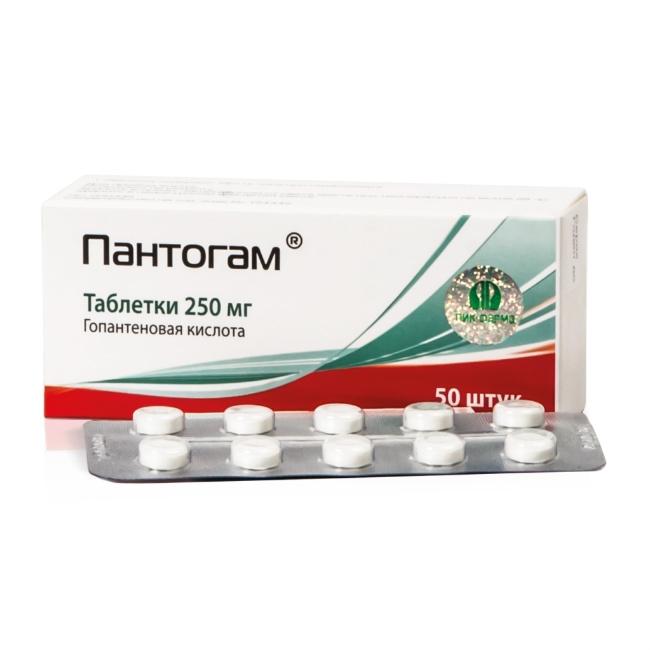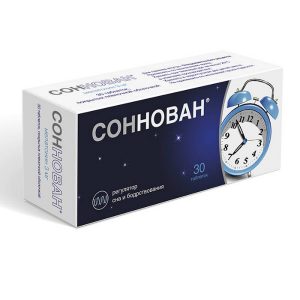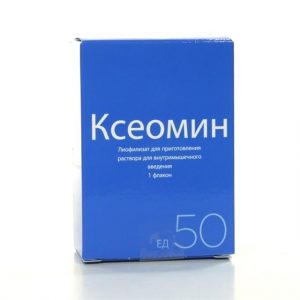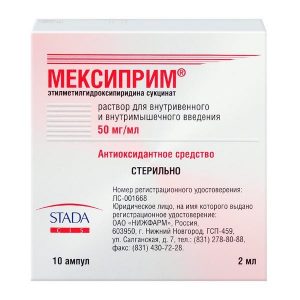Description
Release form
tablets
Packing
50 pcs.
Pharmacological action
The spectrum of action of Pantogam ® is associated with the presence in its structuregamma-aminobutyric acid (GABA). The mechanism of action is due to the direct effect of the drug on the GABAA-receptor-channel complex.
Has a nootropic and anticonvulsant effect. Increases brain resistance to hypoxia and toxic substances, stimulates anabolic processes in neurons, combines moderate sedative effect with a mild stimulating effect, reduces motor excitability, activates mental and physical performance.
Improves the metabolism of GABA in chronic alcohol intoxication and after discontinuation of ethanol.
Able to inhibit acetylation reactions involved in the inactivation of procaine (novocaine) and sulfonamides, due to which the prolongation of the action of the latter is achieved. Causes inhibition of pathologically increased cystic reflex and detrusor tone.
Pharmacokinetics
Pantogam ® is rapidly absorbed from the gastrointestinal tract, passes through the BBB, and the highest concentrations are created in the liver, kidneys, stomach wall and skin. It is not metabolized and excreted unchanged within 48 hours: 67.5% of the dose taken is excreted in the urine, 28.5% – with feces.
Indications of
cognitive impairment in organic brain lesions (including the effects of neuroinfections and head injury) and neurotic disorders
schizophrenia with cerebral organic insufficiency
cerebrovascular insufficiency caused by atherosclerotic cerebrovascular disease Huntington, hepatolenticular degeneration, Parkinson’s disease, etc.)
treatment and prevention of extrapyramidal syndrome (hyperkinetically and akinetic) caused by taking neuroleptics
epilepsy with mental retardation processes in the complex therapy with anticonvulsants
psycho-emotional overload
reduced mental and physical performance, to improve concentration and memorization
neurogenic disorders of urination (pollakiuria, peremptory urge, imperative urinary incontinence, enuresis).
in children with perinatal encephalopathy
mental retardation of varying severity in children
developmental delay (mental, speech, motor or a combination of them) in children
various forms of cerebral palsy
hyperkinetic disorders (attention deficit hyperactivity disorder in children) (with stuttering, mainly in clonic form, ticks) in children.
Contraindications
hypersensitivity
acute severe kidney disease
pregnancy (I trimester – syrup)
pregnancy (tablets)
phenylketonuria (syrup, contains aspartame)
period of breastfeeding (tablets).
children’s age up to 3 years (tablets).
Special instructions
Information about the possible effect of the drug on the ability to drive vehicles, mechanisms.
In the first days of admission, care should be taken when driving vehicles and mechanisms, given the possible occurrence of drowsiness
Composition Active ingredient:
calcium hopantenate (hopantenic acid or calcium salt of hopantenic acid) 250 mg
Excipients:
magnesium hydroxycarbonate
calcium stearate
talc
starch potent substance: potassium methyl cellulose,
calcium stearate,
magnesium hydroxycarbonate,
talcum
Dosage and administration of
Adults: single dose – 0.251 g, daily – 1.53 g for children: single dose – 0.250.5 g, daily – 0.753 g. The course of treatment is 14 months, in some cases – up to 6 months. After 3-6 months, a second course of treatment is possible.
With epilepsy in combination with anticonvulsants – 0.751 g / day. The course of treatment is up to 1 year or more.
In extrapyramidal neuroleptic syndrome in combination with the therapy, the daily dose is up to 3 g, treatment for several months.
In extrapyramidal hyperkinesis in patients with hereditary diseases of the nervous system (combined treatment) – 0.53 g / day. The course of treatment is up to 4 months or more.
With the consequences of neuroinfections and head injury – 0.25 g 3-4 times a day.
To restore performance under increased loads and asthenic conditions – 0.25 g 3 times a day.
For the treatment of extrapyramidal syndrome caused by the use of antipsychotics, adults – 0.5-1 g 3 times a day for children – 0.25-0.5 g 3-4 times a day. The course of treatment is 1-3 months.
At ticks: for children – 0.250, 5 g 36 times a day, for 14 months.
In case of urination disorders: for adults – 0.51 g 2-3 times a day for children 0.250.5 g (daily dose – 2550 mg / kg). The course of treatment is 1-3 months.
For children with various pathologies of the nervous system, depending on age, the drug is recommended at a dose of 1-3 g. Tactics of prescribing the drug: increasing the dose for 7-12 days, taking the maximum dose for 15-40 days and gradually reducing the dose to Pantogam® withdrawal within 78 days. The break between Pantogam® course receptions, as for any other nootropic remedy, is from 1 to 3 months.
Side effects
Allergic reactions: rhinitis, conjunctivitis, skin rashes are possible.
Other: sleep disturbances or drowsiness, tinnitus are possible (these symptoms are usually short-term and do not require discontinuation of the drug).
Drug interaction
It prolongs the action of barbiturates, enhances the action of anticonvulsants, and prevents side effects of phenobarbital, carbamazepine, antipsychotics.
Potentiates the action of local anesthetics (procaine).
The effect of Pantogam ® is enhanced in combination with glycine, ethidronic acid (xidiphon).
Overdose
Symptoms: increased symptoms of side effects (sleep disturbance or drowsiness, noise in the head).
Treatment: administration of activated carbon, gastric lavage, symptomatic therapy.
Storage Conditions
The product should be stored in a dark place at 15 ° C to 20 ° C.
Term hodnosty
3 years
active substance
hopantenic acid
drugstore terms
drugstore
lekarstvennaja form
tablets




